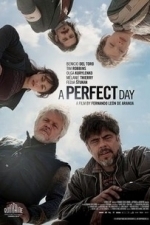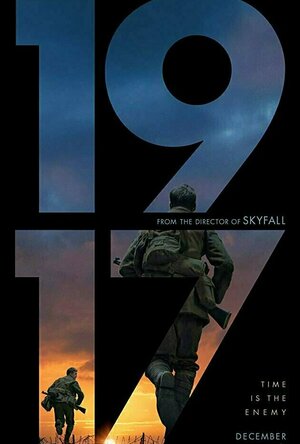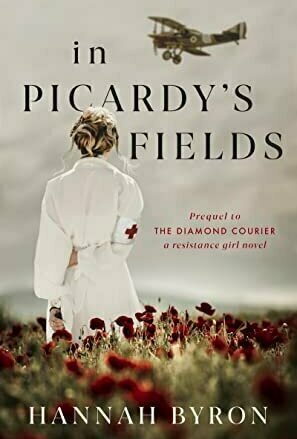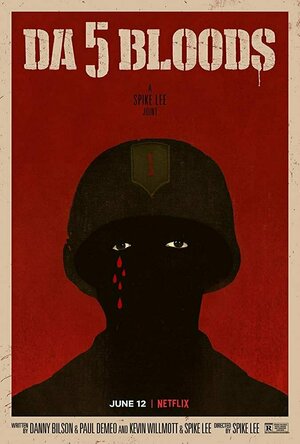Search
Search results
Entertainment Editor (1988 KP) created a video about Onimusha: Warlords in Video Games
Jan 23, 2019
Sonofdel (6291 KP) rated A Perfect Day (2015) in Movies
Apr 15, 2019
A great Insight
This film is not for those wanting an action film based in a wartorn country. This focuses on the country at the end of the war and the Aid Workers who are there to help bring normality back to a divided country. Its well acted and the situations are often dark and disturbing, but the right amount of humour has also been included. Its well worth a watch if you want a drama without the violence prevalent in most films of this genre.
Phillip McSween (751 KP) rated 1917 (2020) in Movies
Oct 25, 2020
Full Ride of Intensity
Set during WWI, two British soldiers are tasked with getting an important message across enemy territory. 1917 is a wall-to-wall thrill ride done in a one-shot fashion that is amazingly unforgettable.
Acting: 10
George Mackay is brilliant as Lance Corporal Schofield. He takes you through the entirety of this journey as a man reluctant to accept the fate that’s befallen him. His showcase of fear in the face of danger is really what drives the intensity of this movie.
Beginning: 9
Not the best first ten minutes of action, but a decent setup nonetheless. I was immediately drawn into this wartorn world and was curious to see what would happen next. Not perfect, but it’s definitely full speed ahead from here.
Characters: 10
Cinematography/Visuals: 10
Conflict: 10
Entertainment Value: 10
Memorability: 10
Pace: 10
There is such a quiet intensity here that drives the pace of the story. Even when shots aren’t being fired, I couldn’t help but be on the edge of my seat. With danger around every single turn, the pace is phenomenal.
Plot: 10
The story is straightforward with a clear objective. Where the plot wins is with a few unexpected turns that throw you off course. Not to mention to be able to do all of this in a set of one shots is remarkable.
Resolution: 10
Overall: 99
1917 touts beautiful imagery seeped in a mountain of dread. There is a scene where the protagonists are wading through heaps of dead bodies that really sets the stage for how harrowing the film is throughout. As war movies go, this one is definitely the most unique.
Acting: 10
George Mackay is brilliant as Lance Corporal Schofield. He takes you through the entirety of this journey as a man reluctant to accept the fate that’s befallen him. His showcase of fear in the face of danger is really what drives the intensity of this movie.
Beginning: 9
Not the best first ten minutes of action, but a decent setup nonetheless. I was immediately drawn into this wartorn world and was curious to see what would happen next. Not perfect, but it’s definitely full speed ahead from here.
Characters: 10
Cinematography/Visuals: 10
Conflict: 10
Entertainment Value: 10
Memorability: 10
Pace: 10
There is such a quiet intensity here that drives the pace of the story. Even when shots aren’t being fired, I couldn’t help but be on the edge of my seat. With danger around every single turn, the pace is phenomenal.
Plot: 10
The story is straightforward with a clear objective. Where the plot wins is with a few unexpected turns that throw you off course. Not to mention to be able to do all of this in a set of one shots is remarkable.
Resolution: 10
Overall: 99
1917 touts beautiful imagery seeped in a mountain of dread. There is a scene where the protagonists are wading through heaps of dead bodies that really sets the stage for how harrowing the film is throughout. As war movies go, this one is definitely the most unique.
Hazel (1853 KP) rated In Picardy's Fields in Books
Nov 27, 2020
Told from two perspectives, In Picardy's Fields is the story of two brave young women during the First World War. Set mostly in France, the two women put gender stereotypes to one side to help the allied soldiers. Baroness Agnès de Saint-Aubin, a young surgeon from Paris, follows her teacher, Dr Alan Bell, to the Château de Dragoncourt on the front lines in Picardy to help her friends, Jacques and Elle de Dragoncourt care for the injured soldiers. Meanwhile, the youngest Dragoncourt child, Madeleine, is determined to escape from her finishing school in Switzerland to play her part in the war effort.
The author, Hannah Byron, accurately describes the devastation and dangers the characters faced both in Paris and at the front. Flowing seamlessly from scene to scene, Byron paints a dark picture of life in wartorn France at the same time as weaving a captivating story. Agnès is a reticent but strong woman, a stark contrast from the stuck-up Madeleine, used to getting her way. Yet both characters develop, forced to face horrifying circumstances. While Agnès becomes more confident, Madeleine uses her head-strong determination to secretly help the allied soldiers, even if it means putting herself in danger.
Whilst the war is the main feature of the novel, the author weaves themes of friendship and romance into the narrative. Although only two people narrate the story, In Picardy's Fields shows the importance of working together and putting aside prejudices. The undercurrent of a developing romance brings a sense of hope that everything will end happily, yet the reader also knows nothing is safe during wartime. With each turn of the page, disaster could befall the characters, which makes for a gripping read.
Hannah Byron admits she is not a medic or war expert, yet she undertook extensive research to make In Picardy's Fields as accurate as possible. She also confesses it is unlikely a female doctor went to the front lines, yet as a work of fiction, this does not matter, especially as Agnès's profession is key to the story.
Authors have written novels about the World Wars ad nauseum to the point that writing an original story seems impossible, but Hannah Byron proves this assumption wrong. In Picardy's Fields feels almost modern in some respects, despite being set in the 1910s, which adds a freshness to the story. These women, these characters are just like you and me, living in a time we could not possibly understand.
In Picardy's Fields is a fantastic debut novel and Hannah Byron is a writer to keep an eye on.
The author, Hannah Byron, accurately describes the devastation and dangers the characters faced both in Paris and at the front. Flowing seamlessly from scene to scene, Byron paints a dark picture of life in wartorn France at the same time as weaving a captivating story. Agnès is a reticent but strong woman, a stark contrast from the stuck-up Madeleine, used to getting her way. Yet both characters develop, forced to face horrifying circumstances. While Agnès becomes more confident, Madeleine uses her head-strong determination to secretly help the allied soldiers, even if it means putting herself in danger.
Whilst the war is the main feature of the novel, the author weaves themes of friendship and romance into the narrative. Although only two people narrate the story, In Picardy's Fields shows the importance of working together and putting aside prejudices. The undercurrent of a developing romance brings a sense of hope that everything will end happily, yet the reader also knows nothing is safe during wartime. With each turn of the page, disaster could befall the characters, which makes for a gripping read.
Hannah Byron admits she is not a medic or war expert, yet she undertook extensive research to make In Picardy's Fields as accurate as possible. She also confesses it is unlikely a female doctor went to the front lines, yet as a work of fiction, this does not matter, especially as Agnès's profession is key to the story.
Authors have written novels about the World Wars ad nauseum to the point that writing an original story seems impossible, but Hannah Byron proves this assumption wrong. In Picardy's Fields feels almost modern in some respects, despite being set in the 1910s, which adds a freshness to the story. These women, these characters are just like you and me, living in a time we could not possibly understand.
In Picardy's Fields is a fantastic debut novel and Hannah Byron is a writer to keep an eye on.
Matt Geiger (15 KP) rated Da 5 Bloods (2020) in Movies
Jun 27, 2020
Da 5 Bloods: Spike Lee Asks Us "What's Going On?"
Spike Lee could not have possibly known that current events and major progresses made in the Black Lives Matter movement would more than likely affect the way audiences perceive Da 5 Bloods, but it’s these developments that, for all of the film’s flaws, imbue it with a sense of urgency befitting of Lee’s filmmaking talents and the beliefs that his filmography has been expounding for decades. In the process of expressing such powerful statements, Lee, in turn, provides a long-overdue voice for the African American experience in the Vietnam War, a conflict that has been portrayed in popular film for about as long as it has been over, and yet strangely, has not been properly balanced in its representation of those who made up the largest percentage of those who served in it.
Continuing Lee’s trend of fusing the past and present together to show that things are definitely still yet to change, Da 5 Bloods finds four African American veterans returning to Vietnam to search for the remains of their commanding officer, “Stormin’” Norman (Chadwick Boseman), and the stash of gold that they found and collectively buried, gold that was initially offered to the indigenous Southern Vietnamese by the CIA as payment for their support of US troops, but taken by the “Bloods” as compensation for their needless sacrifices for a country that has never given them the treatment they deserve despite the fact that they played a pivotal role in helping to make it what it is today. The ultimate goal is nothing that hasn’t been depicted before, but the controversy of the Vietnam War and the experience of combat and violence spills over into today; some of the film’s most striking messages are effectively relayed through a handful of very committed performances from the well-casted ensemble, with Delroy Lindo serving as the beating emotional heart of the film. It’s a career-defining showcase for Lindo, who, as the PTSD-stricken Trump supporter Paul, carries the most weight on his shoulders. He wrestles with personal demons and survivor’s guilt for more than half of his life because of the choices he made during his time in the service, time he and the other Bloods couldn’t avoid because, unlike the privileged white men of America, they were not given the same opportunities to dodge the draft. The disenfranchisement and aimlessness that Lindo merely alludes to through his heart-wrenching performance provides the foundation for the complicated relationship Paul shares with his estranged son, David (Jonathan Majors in the film’s other award-worthy performance), who tags along for the ride in an effort to heal old wounds and bury a deeply-lodged hatchet.
The natural chemistry Lindo shares with the other Bloods (Clarke Peters, Norm Lewis, and Isiah Whitlock, Jr.) is palpable in both the past and present, which blend into one as the screen slides from one aspect ratio to another, shifting from flashbacks of one wartorn world to the present day, in which we find ourselves fighting a different, yet altogether similar kind of war. That these changes in aspect ratios never appear as visually perceived cuts is simply another one of the ways in which Spike Lee seamlessly reminds us that then and now are cut from the same cloth, complete with the same heart-wrenching tragedies that give way to the camaraderie that is necessary to ensure that the proper names get written back into history where they belong. How the four vets are visually represented in their recollections of their commander, which are stripped of the psychedelic imagery associated with previous Vietnam War films in order to cut deeper into understanding what the Bloods’ place in Vietnam is supposed to mean (if it means anything at all), further adds to Lee’s ability to find the haunting parallels between the two time periods that comprise the film.
Spike Lee gets at so many unique and timely concepts that seem perfectly applicable to what’s going on in the world, but where he stumbles is how he goes about explicating these ideas. As a storyteller, Lee is at his best when his narratives gradually develop at a reasonably decisive pace until the tension is fully amplified by the story’s climactic boiling point, at which point there’s no turning back. Such was the nature of Do the Right Thing and, more recently, BlacKkKlansman. The same cannot entirely be said for Da 5 Bloods, which struggles to find a consistent pace and tone during its first act, in which it tries to introduce all of the central ideas at once, along with some unnecessary side stories that carry little to no weight in comparison to the central task and are ultimately resolved in schmaltzy, unsatisfying ways. Moreover, while investment in the film can be maintained throughout, too often is this investment reinforced by the unnecessary moments that serve as detriments to the sequences of dramatic consequence and just might take you out of the story, causing you to restart your investment. Every act has at least one of these moments, with the final result unfortunately falling short of the expectations of some of the genres that are molded into the Bloods’ journey through the Vietnamese jungle. The overtly patriotic and quite distracting score from Terence Blanchard (regardless of whether or not its inclusion was intended as irony) does not help the matter, with many of the best scenes occurring either in silence or alongside the soulful tracks of Marvin Gaye’s What’s Going On album.
Even when Spike Lee stumbles in the execution of his argument, what ultimately matters is the argument itself; while the film begins and ends rather heavy-handedly, telling the viewer things they are bound to already know and incorporating footage that doesn’t need to be there for the point to get across, the sacrifices that Lee chooses to detail and their ramifications for the state of our country to today give the film a degree of value at a time like this, and he is the only director who could bring these issues to the forefront in such an entertaining way. It may not be as good or accessible as his best work, but the calls to action that he has long been affiliated with echo through jungles and cities in equal measure.
What did you guys think of Da 5 Bloods? Agree? Disagree?
Continuing Lee’s trend of fusing the past and present together to show that things are definitely still yet to change, Da 5 Bloods finds four African American veterans returning to Vietnam to search for the remains of their commanding officer, “Stormin’” Norman (Chadwick Boseman), and the stash of gold that they found and collectively buried, gold that was initially offered to the indigenous Southern Vietnamese by the CIA as payment for their support of US troops, but taken by the “Bloods” as compensation for their needless sacrifices for a country that has never given them the treatment they deserve despite the fact that they played a pivotal role in helping to make it what it is today. The ultimate goal is nothing that hasn’t been depicted before, but the controversy of the Vietnam War and the experience of combat and violence spills over into today; some of the film’s most striking messages are effectively relayed through a handful of very committed performances from the well-casted ensemble, with Delroy Lindo serving as the beating emotional heart of the film. It’s a career-defining showcase for Lindo, who, as the PTSD-stricken Trump supporter Paul, carries the most weight on his shoulders. He wrestles with personal demons and survivor’s guilt for more than half of his life because of the choices he made during his time in the service, time he and the other Bloods couldn’t avoid because, unlike the privileged white men of America, they were not given the same opportunities to dodge the draft. The disenfranchisement and aimlessness that Lindo merely alludes to through his heart-wrenching performance provides the foundation for the complicated relationship Paul shares with his estranged son, David (Jonathan Majors in the film’s other award-worthy performance), who tags along for the ride in an effort to heal old wounds and bury a deeply-lodged hatchet.
The natural chemistry Lindo shares with the other Bloods (Clarke Peters, Norm Lewis, and Isiah Whitlock, Jr.) is palpable in both the past and present, which blend into one as the screen slides from one aspect ratio to another, shifting from flashbacks of one wartorn world to the present day, in which we find ourselves fighting a different, yet altogether similar kind of war. That these changes in aspect ratios never appear as visually perceived cuts is simply another one of the ways in which Spike Lee seamlessly reminds us that then and now are cut from the same cloth, complete with the same heart-wrenching tragedies that give way to the camaraderie that is necessary to ensure that the proper names get written back into history where they belong. How the four vets are visually represented in their recollections of their commander, which are stripped of the psychedelic imagery associated with previous Vietnam War films in order to cut deeper into understanding what the Bloods’ place in Vietnam is supposed to mean (if it means anything at all), further adds to Lee’s ability to find the haunting parallels between the two time periods that comprise the film.
Spike Lee gets at so many unique and timely concepts that seem perfectly applicable to what’s going on in the world, but where he stumbles is how he goes about explicating these ideas. As a storyteller, Lee is at his best when his narratives gradually develop at a reasonably decisive pace until the tension is fully amplified by the story’s climactic boiling point, at which point there’s no turning back. Such was the nature of Do the Right Thing and, more recently, BlacKkKlansman. The same cannot entirely be said for Da 5 Bloods, which struggles to find a consistent pace and tone during its first act, in which it tries to introduce all of the central ideas at once, along with some unnecessary side stories that carry little to no weight in comparison to the central task and are ultimately resolved in schmaltzy, unsatisfying ways. Moreover, while investment in the film can be maintained throughout, too often is this investment reinforced by the unnecessary moments that serve as detriments to the sequences of dramatic consequence and just might take you out of the story, causing you to restart your investment. Every act has at least one of these moments, with the final result unfortunately falling short of the expectations of some of the genres that are molded into the Bloods’ journey through the Vietnamese jungle. The overtly patriotic and quite distracting score from Terence Blanchard (regardless of whether or not its inclusion was intended as irony) does not help the matter, with many of the best scenes occurring either in silence or alongside the soulful tracks of Marvin Gaye’s What’s Going On album.
Even when Spike Lee stumbles in the execution of his argument, what ultimately matters is the argument itself; while the film begins and ends rather heavy-handedly, telling the viewer things they are bound to already know and incorporating footage that doesn’t need to be there for the point to get across, the sacrifices that Lee chooses to detail and their ramifications for the state of our country to today give the film a degree of value at a time like this, and he is the only director who could bring these issues to the forefront in such an entertaining way. It may not be as good or accessible as his best work, but the calls to action that he has long been affiliated with echo through jungles and cities in equal measure.
What did you guys think of Da 5 Bloods? Agree? Disagree?



